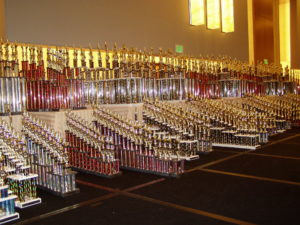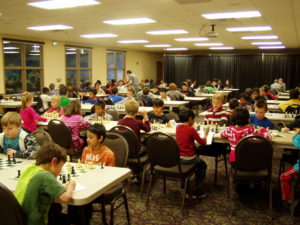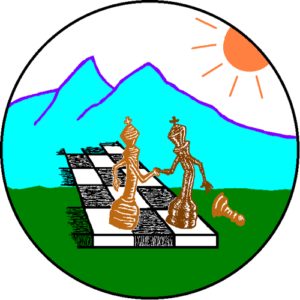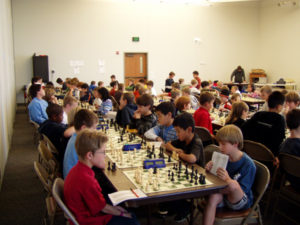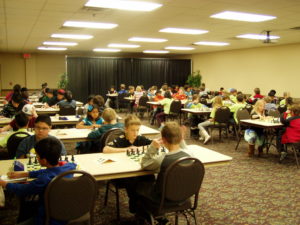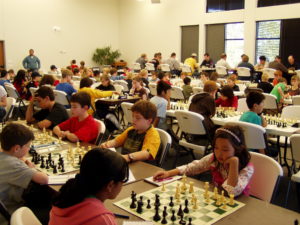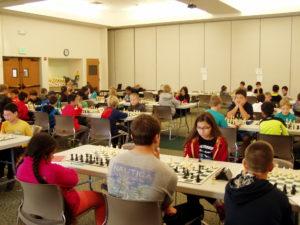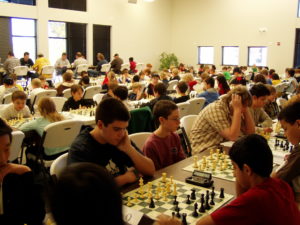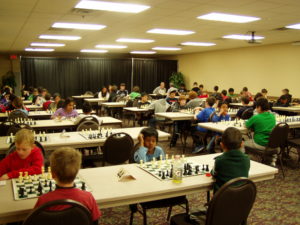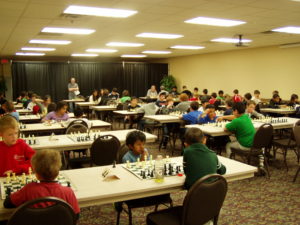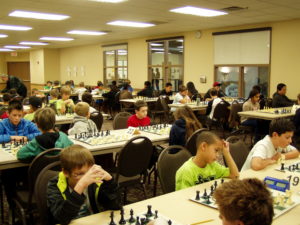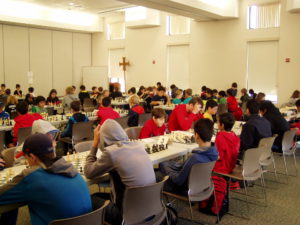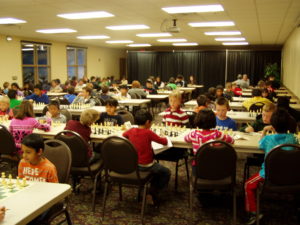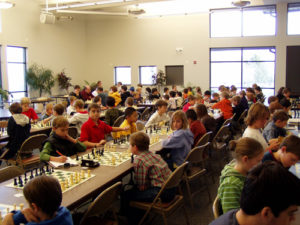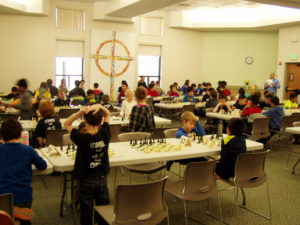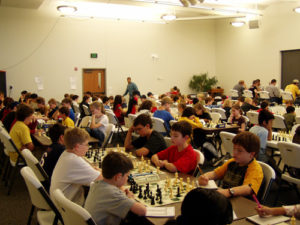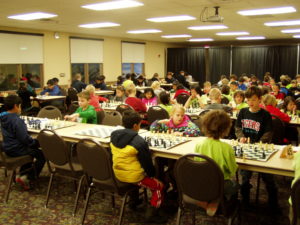Denver Scholastic Chess SeriesUnrated and Rated Chess Tournaments for children in Denver and the Front Range!So that the tournaments start on time, there is NO onsite registration. Please plan ahead and get your entries in early! To look up your rating, click here Scroll down for Tournament Tips for and Tournament Results
You can enter online or with a printable entry form to mail with a check.Entry fee for each tournament is $30 if postmarked or registered online by the Saturday before each tournament. If registering after that, there is a $5 late fee, which makes the entry fee $35. Please register early, if early, so we can plan ahead, helping the tournament run smoother.
or
For hardcopy registration form, click on link below:2023-2024 Mail-in Entry Form2023#1 September 23#2 October 14#3 November 11#4 December 92024#5 January 13#6 February 17#7 March 9#8 April 6#9 April 27
For questions, call Todd at 303-770-6696 (wk)
LOCATION: Bethany Lutheran Church; 4500 E. Hampden Ave.; Englewood, CO 80113[¾ mile west of I-25 on Hampden. Turn left (south) on Dahlia (weird intersection with Happy Canyon coming in at a 45 degree angle) then turn right and park in SE Parking lot. Enter building under covered entry.]
DIVISIONS: (time control G/30 d/5 for all sections)Unrated: K-3, 4-6 (non-rated, USCF membership not required, most players should play in Unrated Divisions)Rated: K-12 (rated, Current USCF membership required)
ENTRY FEES: Pre-Registration Fee: $30, if postmarked one week before tournament. Late Registration: $35 (for all divisions). If late fee is not enclosed with late entry, the $5 late fee must be paid before player can enter tournament. There is NO onsite registration the day of the tournament – so the tournament can start on time. Todd must have all entries (mailed and online) by 6:00 p.m. the Thursday evening before each tournament.TIMES: Check-in 8:00-8:30 a.m. Participation list will be posted before the tournament at the site. Players Meeting (all competitors must attend) 8:30 a.m.; first round at 9:00 a.m. Each tournament should finish around 2:30-3:00 p.m.Swiss-system — ALL STUDENTS PLAY EVERY ROUND EXCEPT FOR BYES or FORFEITS — NO ELIMINATION!PRIZES: Trophies to Top Five finishers in each division. K-3 Unrated will also have a trophy for Top K and Top 1st grade.K-12 Rated will also have a trophy for Top u/1000 and Top u/800. Additional trophies may be added.Team Trophies to the top two teams in the K-3 and 4-6 Unrated Divisions. All scores count toward over-all series prizes.See www.ColoradoMasterChess.com for specifics on PRIZES.LUNCH: Food is not available on site. Please bring your own sack lunch.SUPERVISION: All children must have adult supervision. Parents are responsible for their children’s actions and any damage they may cause to the tournament site. Tournament directors will supervise playing area. Seating space is limited, so, if possible, please limit the number of family members who attend. No soliciting of any kind is allowed. Your private information will not be given or sold to third parties. No balls allowed on the church grounds.
Tournament Rules, Tie-breaks, Pairings, and ByesNo solicitation of any kind is allowed at the tournament site. Your private information will not be given or sold to third parties. United States Chess Federation rules will apply. Tournament is 5 Rounds. Tie-breaks determining trophy winners in each section will be in this order: Modified Median, Solkoff, Cumulative, Opponent’s Cumulative, Head-to-head, Coin Toss. If a section is a round robin, Sonneborn will be the first tiebreak. The result of game between players involved in the tie is the second tiebreak. If there are an odd number of players in a section, one of the players will be awarded a 1.0 point BYE for the round according to the normal pairing system. If you have to miss Round 1 or Round 2, you may request a ½ point BYE. The BYE request must be made before the Late Registration deadline. No ½ point BYE requests will be awarded after the second round (you will receive a zero point BYE if you have to miss a later round) as this can have a major impact on the final tournament results. Divisions may be combined if one has a low turnout. Organizer may change the rules at any time to improve the tournaments. All players scoring 3.5 points or more will win a prize!! Team Trophies for each tournament in the Denver SeriesFor each tournament, a 1st and 2nd place team trophy will be available in the K-3 Unrated and 4-6 Unrated divisions. However, if all of the teams (schools) in one of these divisions have only one player, team trophies will not be awarded for that division (since nobody has a teammate). If a team of two or more players (when adding their scores) finishes behind the first and second place individual trophy winners, the team trophy will not be awarded in that division (since the first and second place individual winners would receive double trophies because the teams of two or more in that division didn’t place). If a team of two or more players wins the first place team trophy, and no other teams (2 or more players per school) are entered, the second place team trophy will not be given out, because there isn’t a second team. If an individual player finishes ahead of a team, and the team totals place the team in second place, the individual wins the first place team trophy and the team who finishes in second (ahead of all the other individuals), will get the second place team trophy. Also, if less than ten players participate in either of these divisions, team trophies may not be given out in that division (although this has never happened). Team trophies may expand, depending on the number of teams entered in the division. Eligibility: A 6th grader who is in Middle School, can play as a member of the Elementary School in his neighborhood that he attended. If this is the case, enter the name of the Elementary School on the application form in the “School” box. This must be entered into the computer correctly prior to the registration cutoff the Thursday night before the tournament. Home school players only qualify to be a member of the team (if there is one) from the public school in their neighborhood that they would normally attend. If there isn’t a neighborhood team from the school a Home school player would normally attend and there are two or more players from the same Home school in the same division, those players can form a team for their Home school. Total points from the top two finishers from each school count toward the team trophy. (A team of one player gets that player’s point total counting toward that player’s school team.) A) TIE-BREAKS: In the event of tied Team scores from above, tie-breaks will determine prize winners. The following rules describe the tie-breaking system used: A1) The first tie-break is the sum of all the total points achieved by the top three finishers from the same school. If still tied, then the top four finishers, etc. A2) The second tie-break is total number of players on each team (this encourages participation). The team with more players in the divisions wins. A3) The third and final tie-break is the sum of individual tie-breaks, in order posted above, of the top two finishers on the team. Denver Scholastic Chess Series End of Year Series Trophies(All of the End of Year Series Trophies below are assuming all 9 tournaments are allowed to take place. If some of the tournaments are forced to be cancelled because of Covid, the End of Year Series awards are subject to change.)
A) ELIGIBILITY: A player must compete in at least six of the nine events to be eligible for an end of year SERIES PRIZE. This encourages participation. (B) SCORING: The first scoring criteria for all trophies and prizes is total accumulated points from all played events. This is a straight number and is not pro-rated in any way. C) TIE-BREAKS: In the event of tied scores at series end, tie-breaks will determine prize winners. The following rules describe the tie-breaking system used: C1) The first tie-break is total number of events played. The player who played in the MOST events to achieve score wins. This is to encourage and reward participation. C2) The second tie-break is grade. The player in the LOWEST grade wins. This rewards the player with the least experience (presumably). C3) The third and final tie-break is final event finish. The player who placed highest in the final event wins. (If neither played in the final event, we go backwards to the next to last final event, etc.) D) MULTIPLE SECTION PLAYERS: Some players compete in multiple sections. Sometimes this is a result of “playing up” with an older group, or from players becoming rated. D1) Players who “play up” will have scores accumulated from different sections. The scores of such players will be applied to the section where the MAJORITY of his\her games were played. If an equal number of games were played in each section, the score will be applied in the section where it gives the player the LESSER prize. This results in less prize impact on other players. This also discourages players from trying to create a score to apply selectively and advantageously at the last event. D2) Players who become RATED will have their scores applied to wherever the majority of their games were played as in D1. D2a) Players who play in the series as UNRATED players but become rated prior to the final events to play in the Colorado State Scholastic Championship in February, will be allowed to complete the series in the UNRATED division. While such players are encouraged to play RATED in the last event(s), it is not mandatory as such a decision could be construed as penalizing players for playing in the State Championship. E) PRIZES: Players who meet eligibility requirements outlined in A) and who’s scores are sufficient will be awarded SERIES PRIZES. E1) SERIES TROPHIES: Players finishing 1-5 in each division (K-3 Unrated; 4-6 Unrated; K-12 Rated) will receive series trophies. E2) SERIES COMPLETION: All players who complete the tour and play in ALL NINE EVENTS will receive an award. E3) SPECIAL AWARDS: Special awards are the sole discretion of the organizers and may be given arbitrarily. Graduation, sportsmanship, improvement, and courage, are examples of possible reasons for such awards. The above rules have been carefully created to be clear, simple, and equitable. Great care has also been taken to implement rules that are difficult to manipulate or “loop-hole”. Suggestions are always welcome. Explanations of these rules and motivations for them are always given. Final ruling on any dispute or disagreement is reserved by the organizer. Yearly ResultsTournament TipsI have touched on these topics in the Player’s Meetings over the years, here they are in written form for you! Tips while at the tournament* Take your time! Chess is a slow game, not a fast game and G/30 time control means that you have only 30 minutes to make all your moves in the game. If you are budgeting your time well, you should be in the tournament room most of the hour allotted for each game…if you are out too soon, you (or your opponent) are moving too fast (usually this is the case); if you lose on time, you are moving too slow. Think of it like taking a test in school…time management is the key. I know this is hard for younger kids…but observe the older and rated kids in the room…notice that they are usually taking all their time and working hard till the end of each game. * All rated players and kids second grade and older should keep score by recording the moves of their games (this is not a requirement, but is highly recommended). This slows you down, gives you a record of the game, and gives you written proof to validate a piece location dispute or draw claim. It also is an opportunity to practice Blumenfeld’s rule, which can drastically cut down on errors. It is really easy to learn how to record the moves in algebraic notation and you can purchase scorebooks that hold around 50 games at any online chess store. If the kids around you aren’t keeping score, that doesn’t mean you shouldn’t! It is very easy to learn how to read and write chess and it doesn’t take much practice to get good at. No excuses! * Purchase and learn how to use a chess clock…like keeping score, it is easy to learn how to use a clock. All the rated kids should bring and use their clocks each game in the tournament. Decent digital, time-delay clocks, can be purchased for around $30-$50 online. If you treat your clock well, it should last you a lifetime…or close to it! * Between tournament games, take a break from chess. If you are using your time properly, you won’t have much of a break between games and the most important thing to do is to rest and be fresh so you are thinking clearly for the next round. You may feel strong and alert at the start of the day, but by the final and most critical game, working your brain continuously for 4-5 hours will take its toll and this is when being fresh so you can think clearly matters most. Hang out with your parents, go for a walk with them, grab a snack or a drink. * Don’t play speed chess, bughouse, or spend time looking at the game you just completed at the tournament with this precious break time. Trying to find some detail you think you may glean from the recently completed game that might help in the next game is counterproductive. The odds of the same concept coming up again right away is slim (you likely won’t even have the same color next round). Trying to learn new ideas during a tournament is analogous to cramming for a test and is ill-advised. Any credible chess coach will tell you that being well-rested and in a good frame of mind matters most. When should you get rated?Call me before getting rated and entering a rated division. Rated players are generally much stronger and it highly recommend that players consider getting rated only after they consistently place high in Unrated Divisions. Players who get rated too soon typically have low ratings under 500. The rating scale at the low end of the rating scale is inaccurate. How to improve the fastestIf you are interested in getting a referral for a good chess instructor, please let me know and I can refer you to someone in your area of town or part of the state that has a proven track record as a good coach and is good with kids. For qualities you should look for in a good chess coach, click here. Selecting good events to play inBesides being of high quality, the biggest reason that the Denver Scholastic Chess Series (and my summer Chess Camps for that matter) draw large numbers of students is that other chess coaches trust that I won’t approach or allow others to approach their private students for lessons. Most chess coaches are of high moral character and respect other coaches by not attempting to acquire their students for themselves – unfortunately though, exceptions occasionally pop up once and a while. The Denver Scholastic Chess Series has been well-attended for years. If you are considering playing in say, a scholastic tournament out of state, it is best to check the organizer’s past events online to see the rating distribution of the players to be sure it is good fit strength-wise. This can save you a lot of time and money and prevent a situation where you find out later that there are only a handful of players that even showed up. (Just because you see an advertisement for a tournament somewhere doesn’t mean it is a large tournament like the Denver Scholastic Chess Series tournaments that offer a wide range of players and divisions that fill up and provide sufficient levels of competition to match a given individuals needs.) A large tournament offers the opportunity to play players of comparable strength – not players that are either too strong or too weak because only a handful of players participate. You can always check the number and strength of the attendees in the rated division of a past tournament by going to the USCF website and searching one of the past player’s name or the tournament director’s name to see the results online. If the organizer of the tournament has a website, usually the Unrated Division results for past tournaments will be posted there….if results aren’t posted, it is possible that the event was poorly attended and the organizer will want to hide this fact. The results from past years of Denver Scholastic Chess Series tournaments are posted at links just above the “Tournament Tips” section on this page. Elementary school children should play in scholastic chess tournaments where they play against other children. The top kids in the Denver Scholastic Chess Series are usually rated about 1300-1500 – so there is plenty of strong competition. Adult tournaments and clubs are also available – but generally not advised for children unless they are at least in middle school or preferably in the high school age range (also be very careful if your children play chess online – if they do, turn off the “chat” feature – don’t allow them to interact with adults who you do not know). Mixing young children with adult chess players is generally not a very good or safe idea. Although many of my friends are adult chess players and are very nice, normal people, there is a MUCH higher percentage of really weird adults hanging out at adult chess tournaments and clubs than in the general population. Most parents are aware and cautious of who their children associate with…this is especially important when considering adults they may be in contact with. I have personally known quite a few adult chess players who have been convicted of a variety of very serious crimes and have spent time in prison (or are still in prison). At all my camps and tournaments I am very careful only to hire normal and safe adults to be around the children that I am responsible for. Please call if you want more specifics. |
